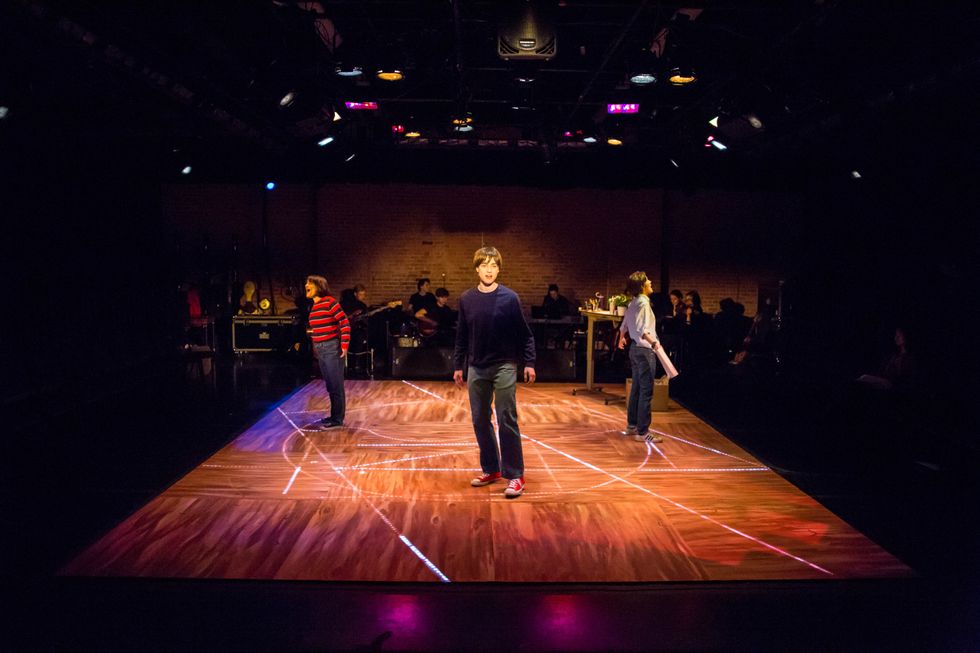"Fun Home" at Center Stage Baltimore was the most realistic adaptation of an LGBT person's coming out and acceptance experience that I have ever seen in the theater, movies and even television.
"Fun Home," is a musical adapted from Alison Bechdel's graphic novel based on her life growing up with a closeted gay father and discovering that she is a lesbian. The Center Stage production was directed by Hana S. Sharif and ran from Jan. 17 until Feb. 24. Sharif has directed "The Christians," "Les Liaisons Dangereuses," "Pride & Prejudice," "Sense & Sensibility," "The Whipping Man," and many more. Her rendition of "Fun Home," hit home with the casting, and the theater in the round gave the audience intimate glimpses of Bechdel's life story.
"Fun Home" came to Broadway in 2015 and has been playing across the country and in other countries as well. The Center Stage production cast includes Andrea Prestinario, who plays 43-year-old Alison who is recalling her life events while writing her memoir and graphic novel. Prestinario, an award-winning Equity actress perfectly captured the character of Alison as she reflected on her experiences growing up.
Through the complicated relationship with her father, there were elements of humor and child-like wonder of Alison's life in "Fun Home." Molly Lyons plays Alison as a child. Lyons brought a bit of humor into the musical, teaming up with Liam Hamilton and Jon Martens, who play Alison's brothers Christian and John.
The children grew up watching their dad work in a funeral home, and make a stage out of the morbid environment they played in. Using the minimalistic stage set up of a casket, the children create a commercial for the funeral home filled with '70s and modern-day dance moves and whimsical lyrics that make you forget that it's a commercial for a funeral home.
The music, composed by Jeanine Tesori, a Tony Awarding winning composer, wove together the tragedy and epiphanies of "Fun Home." Songs like "Edges of the World" and "Telephone Wire" reflect the complicated relationship between Alison and her father Bruce. Jeffry Denman plays Bruce in the Baltimore production; he shows the audience the complex and distressed sides of Bruce.
Bruce is conflicted about his sexuality, and seemingly depressed about it. The song "Edges of the World," expresses his dissatisfaction with his life and how he only feels okay when the sunlight hits a certain spot in the parlor of his home. He is a perfectionist, and although Alison and he were very similar, he often emotionally abused her as a child.
The song "Telephone Wire," was one of the most powerful songs of the musical, a small scene of time that most people, including myself, could relate to. Alison and Bruce go for a ride, their last ride before he dies, and Alison wants to talk to him but just can't seem to get the words out. This hits home for anyone who has wanted to tell someone something in the car, but they just are trapped in silence, praying for the next traffic light to come and gain the courage to speak.
The most powerful song "Days and Days," was sung by Alison's mom Helen, played by Michelle Dawson. This song describes Helen's inner turmoil of watching her husband slip away from her, as well as the days she can never get back. She took care of his museum-like house and perfectionist needs, only to learn Bruce cheated on her with young men he lured in with alcohol.
Dawson's emotion came through in this song, and you could feel the years of bottled emotions explode in a 3-minute song.
College-age Alison is the most relatable character to LGBT youth today. Played by Laura Darrell, part of the musical flashbacked to Alison accepting the fact that she is a lesbian, especially when she meets Joan, played by Shannon Tyo. As Alison's first love, Joan becomes the reason she accepts her sexuality, and she sings a song called "Changing My Major," which describes the overwhelming feeling of falling for a woman for the first time.
Alison Bechdel has been a trendsetter for the LGBT community, through her cartoon series called "Dykes to Watch Out For," and with her graphic novel "Fun Home: The Tragicomedy," and "Fun Home" the musical. She is real about her sexuality with her readers and audience, and I think that truly came through each character that played her at different stages of her life.
The set was just enough to tell the story of Alison and was quite minimalistic. Even though Bechdel herself tried to remove herself from the musical process, her cartoons and drawings appeared on the six square screens and gave the audience an intimate look at her drawings of her father.
A trap door helped smoothly change scenes, and furniture on wheels transformed the stage from the Bechdel's home in Beech Creek, Pennsylvania, the funeral home, Alison's college bedroom, and even a car. It was just enough to make the audience feel the nostalgia of older Alison reflecting on the places she lived. The trap door lowered Bruce down into the stage in a whirl as his death by bus was reenacted.
"Fun Home" truly captured the story of a woman who struggled to accept her father's death, sexuality, and her own sexuality. It was raw. It was authentic and full of emotion leaving audience members of all ages, especially LGBT audience members, with tears in their eyes. The full circle of Alison reflecting on her life at her desk was authentic, for she was at peace with her father.
The dysfunction of family and the proper representation of LGBT people, not as sex objects, but as people with struggles like anyone else, were combined to create a piece of art that will have an impact for years to come.



















